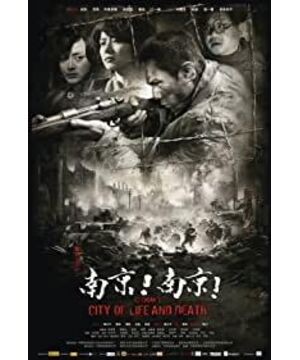The era when no one has the patience to read words anymore
I want to tell a ridiculous story at ten o'clock every Tuesday night, welcome to pay attention
---------The end of the commercial, I give way-----------In the process of watching the movie. Sitting next to me is a fat big brother. Holding a bag full of popcorn and a glass of Coke. A very interesting situation happened. Whenever there is a scene with great visual impact such as killing, rape, insult, etc., the fat man sighs heavily, then grabs and chews the popcorn, then Coke, and finally hits a huge plump. Very resonant hiccup. His girlfriend has been wiping tears aside. In the second half of the movie, she kept asking Big Fatty, why do you keep talking about the Japanese? When I came out of the screening hall, I noticed the huge sign that the movie theater had erected at the entrance of the stairs, with the title words such as "Signature to support the release of "Nanjing! Nanjing!" in Japan. Seeing the fat brother and the couple squatting there, they found their names in the space between the signatures, and their expressions were very complicated. Specifically, I can't tell whether it is a pain, or moved, or sad and angry, or even a satisfied expression. I was thinking about this scene and that awkward title all the way after that. I also don't know if every Chinese who signed there had the mentality I imagined at the time. What's under the cinema screen seems more engaging than what's on the screen. That's why I think Lu Chuan has both succeeded and failed. Like "Kekexili", "Nanjing! Nanjing! "The moral height of the film has largely overshadowed the objective evaluation and in-depth thinking that the film should have. But I still have to give it five stars, but only if I make it clear that it's not the film's carrier that draws attention, but the essence behind it. Although more and more people, especially some young Chinese, are gradually ignoring this history. However, under this general environment, discussions involving Japanese aggression against China, especially those involving historical atrocities such as the Nanjing Massacre, are still quite sensitive. So much so that, for example, for "Nanjing! Nanjing! ” Such criticism of the film itself will naturally be forced to be understood as a denial of history or an immoral subversion, which will then lead to many irresponsible cursing and irony. As mentioned above, the moral height it has raised has made many people not allowed to express criticism of its mere carrier form. Like the victims of the Holocaust, we, who are also the sufferers, are not all part of a nation with rational moral standards. If we can see such a phenomenon only from this viewing process, then I do not Needless to say, it was still ubiquitous for a long time before the Nanjing Massacre and even now. "What happened to our nation?" I was horrified by a certain sense of playfulness that suddenly came to my mind after such a question came up in my mind. While watching the film, two words popped into my head - "independent personality" and "populism". Which of these is our society asking us to learn? It is still not clear. I believe that what Lu Chuan wants is not a sigh over Coke popcorn, or a huge signboard supporting the release in Japan, or populism. So what needs to be returned is the "independent personality". Whether the movie will be released in Japan is none of my business. All I can say is that if their citizens don't have a chance to face up to this historical event, it's their loss. But I don't think that the signature plate in the movie theater, and the specific individuals represented by those names, or the majority of the audience they represent, are worried about whether the nationals of the violent countries will suffer losses. Let's be frank and direct: It's just a quick senseless numb masturbation out of gratification. I'm referring to the signature plate title like that. But I don't want the film to take such steps. It makes sense that the movie couldn't be shown in Japan. The Japanese government does not want Japanese citizens to see the history behind some of the images, which is the same as some of our government's policies towards its own citizens. Even if those histories are true. The howls, the blood, the weeping and the hopelessness, beyond the distance of time, once did echo clearly on the ground beneath my feet. But we are not rulers or managers, so even if we have rights, we have to admit that rights are bullshit in reality. In other words, the only person who should really care about whether the film can be released in Japan is the film's distribution company. Given the choice, I'd rather have those autographs with the headline "In support of the reduction of ticket prices and the implementation of the movie rating system", so that more and more appropriate people can think about this history. I have to say that national pride has been smeared more and more by our propaganda apparatus. That's why I have the urge to laugh when I think of the question "what's wrong with our nation". The source of national pride is not populism, and of course you can be unhappy, although even if you are happy it means nothing. Nor does it originate in some senseless psychological satisfaction, and we do not get the national cohesion that we deserve because the descendants of the Japanese are permanently burdened with guilt and guilt. It turns out that before this land in our country , those key words such as "boycott" and "blocking" all the behaviors have quickly become impotent. The distrust, misunderstanding, and disunity that abounded among people were not diminished by the sudden, ecstatic excitement. People who want to leave the country and go abroad to win better living conditions, a higher quality of life, and more respect are not because of some people who are screaming at the door of the supermarket during the day and go back to the computer at night to play games all night Reduce one or two. This is also the reason why I am more inclined to praise "The Devil Has Come" compared to this film. "Nanjing! Nanjing! "Can't be released in Japan, just like "The Devil Has Come" can't be released in China.
View more about City of Life and Death reviews











